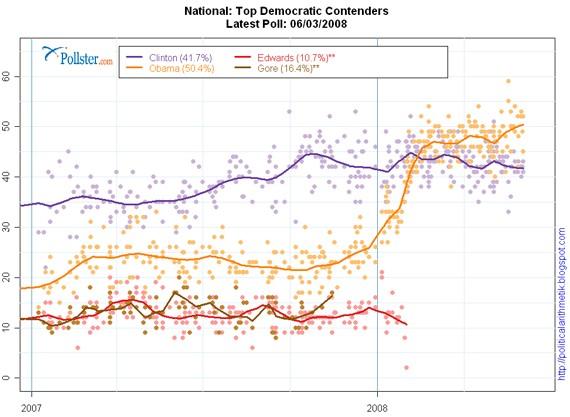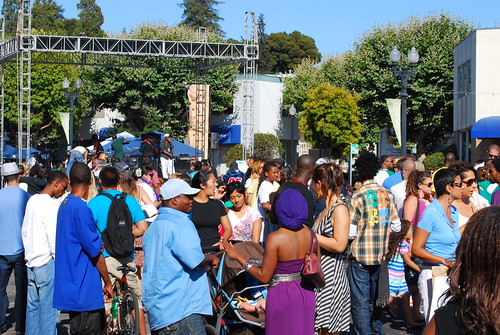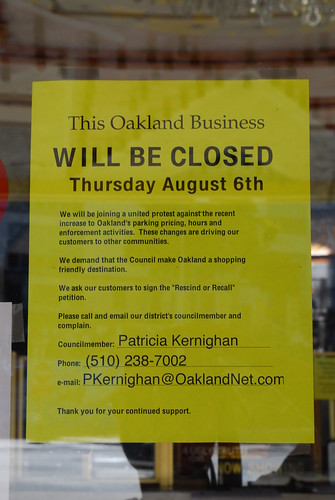Today’s New York Times has an article about the debate among supporters of marriage rights over whether to pursue a reversal of Proposition 8 in 2010, or to wait until 2012 when there will have been more time to recruit large donors, shift public support, build a broader grassroots movement, and so on:
Marc Solomon, marriage director for Equality California, said he spent June and early July asking the opinions of nearly two dozen California political consultants and pollsters and had been surprised by the almost unanimous opinion that a 2010 race was a bad idea.
“I expected having watched the protests and the real pain that the L.G.B.T. community had experienced that there would be some real measurable remorse in the electorate,†Mr. Solomon said, referring to lesbian, gay, bisexual and transgender people. “But if you look at the poll numbers since November, they really haven’t moved at all.â€
A major factor in any California balloting, of course, is money; campaigns here are remarkably expensive, with a number of costly media markets. The Proposition 8 campaign, for example, cost more than $80 million, with opponents spending some $43 million.
[…]
The argument against 2010 was expressed by a new coalition of groups known as Prepare to Prevail, which announced in a statement on July 13 that going back to the ballot next year “would be rushed and risky.â€
“We should proceed with a costly, demanding and high-stakes electoral campaign of this sort only when we are confident we can win,†the statement read.
The issue of timing has increasingly divided gay rights advocates, with larger, more established groups seemingly favoring a more cautious approach and grass-roots groups — some of them formed since the November election — more vocal in support of a quick return to the polls.
John M. Cleary, president of a Los Angeles group called the Stonewall Democratic Club, said many younger activists were particularly eager to fight Proposition 8. “I find the language of some of the organizations really self-defeating,†Mr. Cleary said. “And I think we have a moral obligation to overturn this.â€
When I read these quotations, I can’t help but think of the 2008 Presidential campaign, specifically the Democratic Party’s nomination fight, and the debate about whether it was “too soon” for Barack Obama to run for President. Before Obama announced his candidacy in early 2007, and even into early 2008, many of the “larger, more established” voices in the party were arguing, based on expert advice from “political consultants and pollsters,” that Clinton’s nomination was inevitable, that the country was not yet ready to elect a black guy with the middle name “Hussein” as President, that Obama would not be able to compete financially because “major donors” would not invest in a risky candidacy, etc., etc. Meanwhile, many “younger activists” believed that the establishment of the party had been too cautious, too ready to concede defeat on matters of principle, and too willing to believe that poll numbers were set in stone.
Throughout 2007, Obama hovered betwen 20% and 25% in nationwide Democratic nomination polls, while Clinton began at 35% and was over 40% in the last months of the year. Obama did not lead Clinton in a single major national poll until after he won the Iowa caucuses. Let me emphasize that: no major national poll showed Obama with a lead over Clinton until after the voting had already begun. (He did lead in some state polls, although even in Iowa most polling showed Clinton with a lead up until the end, which shows that, yes, “community organizing” and get-out-the-vote efforts can be decisive, especially but not exclusively in caucus votes)

That polling situation, combined with the overwhelming support of the party establishment, led many political consultants to believe that Obama simply couldn’t win the nomination. They might admire the guy’s political skills, and they might tell reporters that he could be the future of the party if he waited for his time to come, but many were convinced that he had run too soon and would go down in history as 2008’s Howard Dean, able to raise a lot of money online and excite a certain young, educated, urban slice of the base, but unable to actually win the nomination. Is there a lesson here for supporters of same sex marriage?
Before I get any angry comments about how Obama himself has ended up being too cautious, has been too ready to concede defeat on matters of principle, and has betrayed the GLBT community by putting gay rights on the back burner since he was sworn into office, please understand that I am not making any ideological analogies between the nomination battle and the fight for marriage rights. I’m only addressing the political strategy and tactics. Obviously every campaign has its own dynamics, and perhaps Obama would have gone down in history as just another Howard Dean if there had not been such an overwhelming appetite for a change from business as usual. Both sides of this internecine debate make pretty compelling arguments, but I personally come down on the side of moving quickly and continuing to try, try again.
Who can forget the criticism that Gavin Newsom received from establishment political consultants when he took the sudden step of allowing same sex couples to get marriage licenses in San Francisco in 2004? People said he had moved too quickly and too boldly, had not laid enough groundwork, and had set the larger gay rights movement back with his rash, unilateral action. More than five years later, despite some backlash and some setbacks, I believe he ultimately advanced the cause of same sex marriage, and I doubt that same sex marriage would have been legalized in six states (not including California’s brief moment of sunshine) if Newsom hadn’t forced the issue into the national debate. Sometimes politics, and leadership, requires setting out to actively change public opinion through pressing an issue, over and over and over if need be, rather than assuming that the state of public opinion is an immutable given. Back to the Times article and John Cleary:
He and others who support a 2010 campaign say they have a number of factors in their favor, including a newly galvanized base, a decline in advertising costs in a depressed television market and two potential Democratic candidates for governor — Attorney General Jerry Brown and Mayor Gavin Newsom of San Francisco — who have been outspoken in support of same-sex marriage.
But some national leaders are dismissive of such arguments.
“A slapdash effort based on wishful thinking, rosy scenarios, and passion, is not enough to win on,†said Hans Johnson, a board member of the National Gay and Lesbian Task Force.
That may be true, but how about a non-slapdash effort based on wishful thinking, rosy scenarios, and passion? The Obama campaign showed us that wishful thinking, rosy scenarios, and passion can be a winning strategy if it is carried out with discipline, perseverance, and intelligence. Proposition 8 is a stain on California’s constitution, and anyone who has ever spilled anything on a tablecloth knows that the sooner you wash out the stain, the less likely it is to remain forever.












